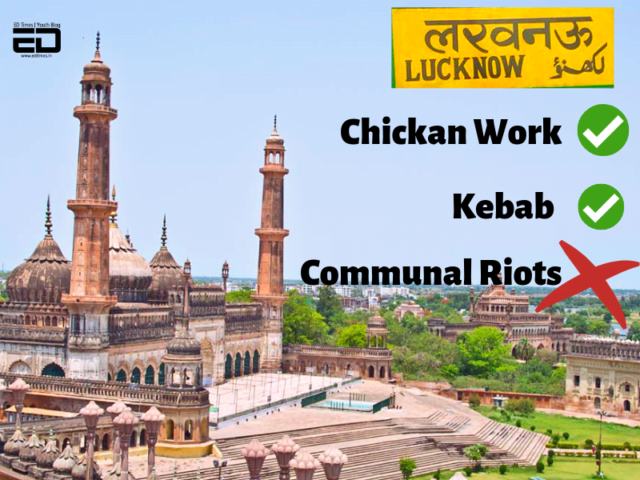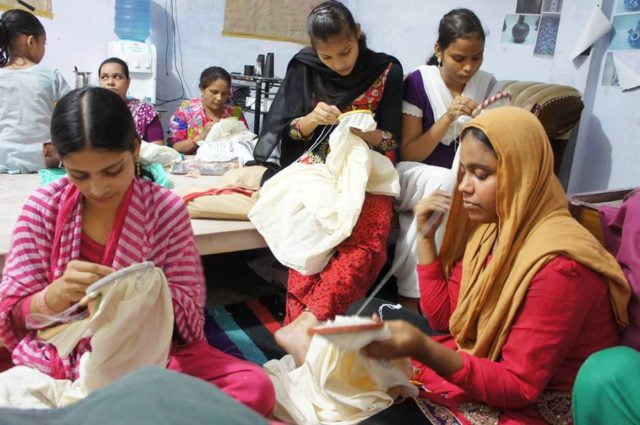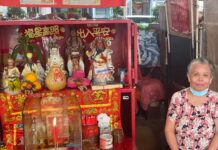By Darshna Kumar
Understanding communal violence through its non-existence
Hindu-Muslim violence over the years has made us witness horrific scenarios of human suffering. Between the period of 1982 and 1995, 674 riots exploded with 4,687 individuals reported to be killed.

However, communal violence is not universal in India.
Some areas are more communal violence prone while some areas have remained comparatively calm.
These riots might be a result of historically built hatred or systematic strategy of politicians but we’ll never know until we look at the relatively calm areas.
What makes people in these calm areas to live and work together without indulging in religious violence?
Existence of communal harmony
One such area where peace prevails when it comes to communal violence is the industry of chikankari in Lucknow.

Chikankari is a form of traditional embroidery and its biggest industry is in Lucknow. It employs half a million people and forms the basis of Lucknow’s economy. The final product is the result of work done at various levels.
All the levels are managed by the trader-cum-manufacturer.
Most of the traders belong to the Hindu community while the basic artisans of the industry belong to the Muslim community and have traditional skills.
People from both communities work in this industry without indulging in violence.
Lucknow’s only major riot occurred in 1924 and there were no riots during 1947 or after the demolition of Babri mosque in 1992.
What explains the grounds of such co-operation and amity?
Unfolding amity
Occurrence of communal violence, of course, is affected by the strategy of politicians and the history of religions but there are reasons as to why people in this area are able to co-exist in the presence of such triggers of violence.
There are reasons as to why in-spite of being 120 kilometres away from Ayodhya, they manage to maintain their amity.
On field observation the factors that seem to contribute in the co-existence of both communities appear to be majorly economic interdependence and familiarity with the other community. Both these factors lead to the formation of trust which forms the basis of peace.

Given, the informal nature of the industry and absence of formal contract, the only thing binding the workers of chikankari industry is trust on each other.
A washerman in the old city, who washes the clothes after the embroidery is done, tells us the secret of his economic success, “I maintain trust. Suppose when they give me clothes to wash, the count of the clothes in the register is hundred and actually it is hundred and twelve. I fairly return the extra pieces, also”.
A place where nothing legal is binding humans from different religion, trust is the only option left.
These workers of the chikankari industry live mostly in the old city.
There is part of the old city which is formed of segregated neighbourhoods, in words of a resident, “It’s like a miniature version of Hindustan and Pakistan”.
It was found that people living in segregated neighbourhoods were not open to the idea of informal relationship with the other community. They were good in maintaining formal contracts with the other community as the business demands this from them.
People in mixed neighborhoods were mostly found to have good informal relationships with the other community. Mixed neighborhoods involve daily contact and undo the myths about the other community.
Also Read: Lucknow Is UP’s Capital But It Is Starkly Different From Its ‘UP-Bihar Wala’ Image
Is it the fear of other religions or is it unfamiliarity that we fear?
Something which is unknown and only stories about it have been heard turns out to take the form of evil. One always fears the unknown. We feared the outer space when it was unknown.
Now, thousands of people are wishing to travel to outer space. Familiarity makes one comfortable with the other that was unknown in the past.
Familiarity with formation of trust at every step can turn into attachment. One gets attached to non-living things and non-human animals, the other in this case is after all a fellow human.

A chikankari artisan tells us, “My family members don’t stop us on interacting with Muslims. My mother ties rakhi to the Muslims who live adjacent to our house. I call them mama.”
Familiarity with the humans of the other community can lead to personal bonds that have the potential to become stronger than the economic bonds.
This familiarity with the culture of the other community will lead to the thought that this is not something alien, but something that belongs here.
Women going out of the house to work might seem normal and mundane today, however, a lot of effort has went into making it feel normal.
Similarly, non-existence of violence and amity in these groups may seem normal but there are underlying reasons to it. This might not be an ideal set-up but we have much to learn from it.
Image Credits: Google Images
Recommendation:

































